In addition to responsible tasks, privileges, and fancy parties, diplomats and their families are faced with the great challenge of constant relocation, as well as the occasional longer absence from each other. Ambassador of the Federal Republic of Mexico to Hungary, H.E. David Nájera Rivas and his charming, also diplomatic spouse, H.E. Ana Aguirre O. Sunza speak honestly about commitment, love, passion, and the important topics that concern them…
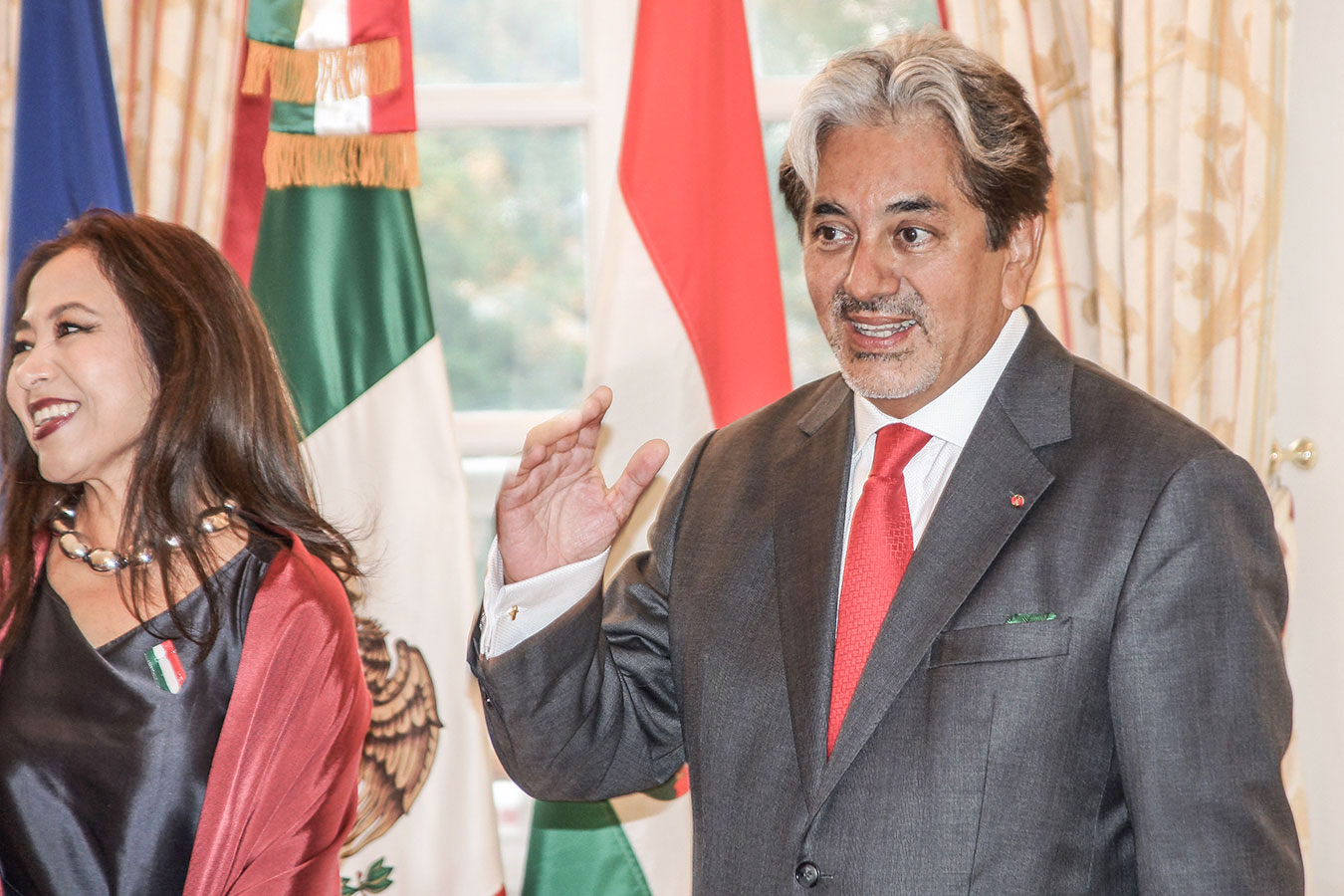 Mr. and Madam Ambassador at the Mexican National Day reception (13-09-2018) (Photo by Ivan Aigner)
Mr. and Madam Ambassador at the Mexican National Day reception (13-09-2018) (Photo by Ivan Aigner)
+++ Kattints ide a cikk magyar változatának olvasásához! +++
Many Similarities
[To Mr. Ambassador] Your business, Asia & Africa, as well as national security studies have provided you with all the essential tools for successfully representing your homeland and ensuring a steady strengthening of its bilateral relations with other countries. What similarities have you noticed and what differences in flavor / the way of life have you discovered in Hungary? What are your impressions?
Each one of my country experiences has provided me different understandings as well as similarities. I think that my background, my studies have certainly helped me a lot to adapt to other cultural conditions as well as my knowledge or perception of my own culture which is the basic reference that a diplomat needs to keep in mind in order to represent his country and to create a shared reality and integration with other different cultures. I find a lot of common ground between Hungary and Mexico in our cultural practices; as well as in many aspects of the way we are. We might look generally happier than people in Hungary, but at the same time, for example, we are as nostalgic as Hungarians are. Because, in the end, we are all human beings and nationalities are much more political constructions.
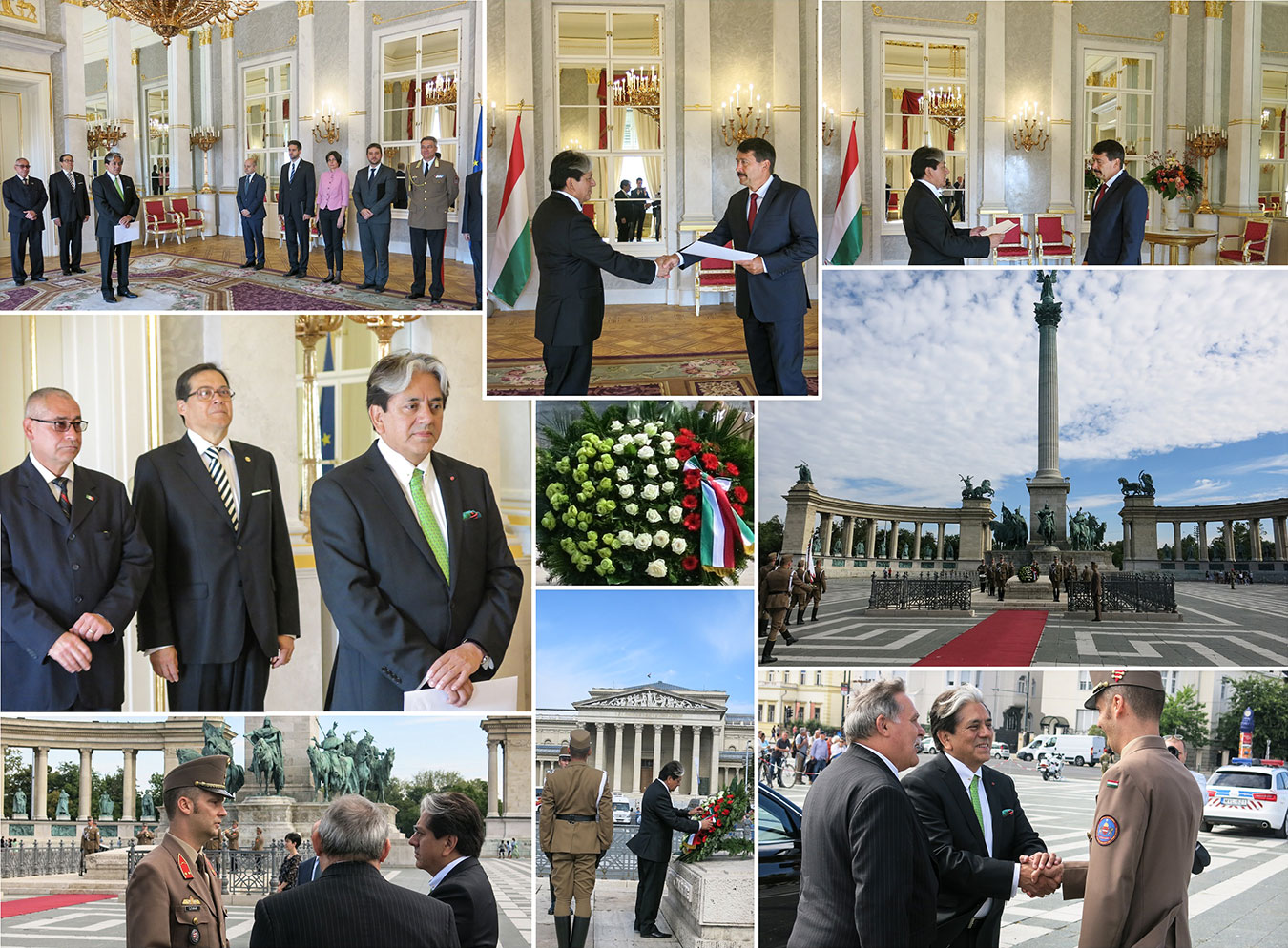 A megbízólevél átadása Áder János köztársasági elnöknek és a Hősök emlékkövének megkoszorúzása (2017.09.06.) (Fotó: KEH/KKM Protokoll)
A megbízólevél átadása Áder János köztársasági elnöknek és a Hősök emlékkövének megkoszorúzása (2017.09.06.) (Fotó: KEH/KKM Protokoll)
Freedom and Critical Thinking
[To Mr. Ambassador] On top of your diplomatic career, research, teaching, and lecturing activities, as well as authoring a number of articles on international and cultural issues show not only a commitment to the present but a strong devotion to future generations. What are the values that matter the most and that you are proud to spread wherever you represent your country?
What matters the most to me is freedom, especially the freedom of expression. To me this is a basic tool; a basic step forward to represent a country, to refer to what you are doing, where you are coming from, your knowledge of history, and your sight of the future. I appreciate a lot when I have a chance to talk with young people at schools or universities where they proudly express their appreciation for their country, their aspirations, and critical perspectives. That creates a special dialogue where we can discuss much more than just basic cultural issues; here we have the chance to share our common interests and worries, as for example, about the climate change and its impact on all of us, something that requires a certain attitude for making a real change.
Identity and Love
[To both] Though doing it for a higher purpose, how much has your family life been affected by living in different countries and changing positions every couple of years?
I would not necessarily say affected; it is certainly that but I will avoid this term from a negative perspective. Of course, it means that we need to adapt regularly to different conditions and to spend time separated. My wife, she is a carrier diplomat too, so she has her own duties and responsibilities. In most of our careers, we have managed to be posted together, but more than once we have been relatively separated, visiting each other regularly but we are used to that. It has not been easy and always in the center of our decisions our daughter has played a key role; I do not think there is a specific formula for it. It depends a lot on the family. In the case of our family – the two of us, our daughter and our pets – what we try to always move every time we go to another country is the external parts. What never changes are our own identity, our tenderness, and our love for each other, and that built the essential support for this career.
+++ Do not miss other interviews and reception reviews! Click the KÖVETÉS button… +++
Balance
[To Madam Ambassador] Creating a fine balance between being a caring mother, a devoted wife, supporting the demanding career of a diplomat while being an independent woman requires a variety of skills and an extraordinary level of energy. What is your personal secret?
Even with the emancipation, what is written and declared it is a fact that we, women still have to work much more than men. We have a double journey, we have our official one, in my case as a diplomat, and then we have lots of other responsibilities at home. Certainly, my husband helps a lot but, in the end, there is a cultural determinate ambiance around us, women. I do not agree with that and even with a partner that can be very equal, in the end, these cultural issues are around us, and still going to be for a while if we do not really tackle them in order to create a more equal distribution and retribution. Anyway, I am a woman, I love to be that way and I think it gave a lot of advantages in many senses. The personal secret for me is a balance between challenges and opportunities.
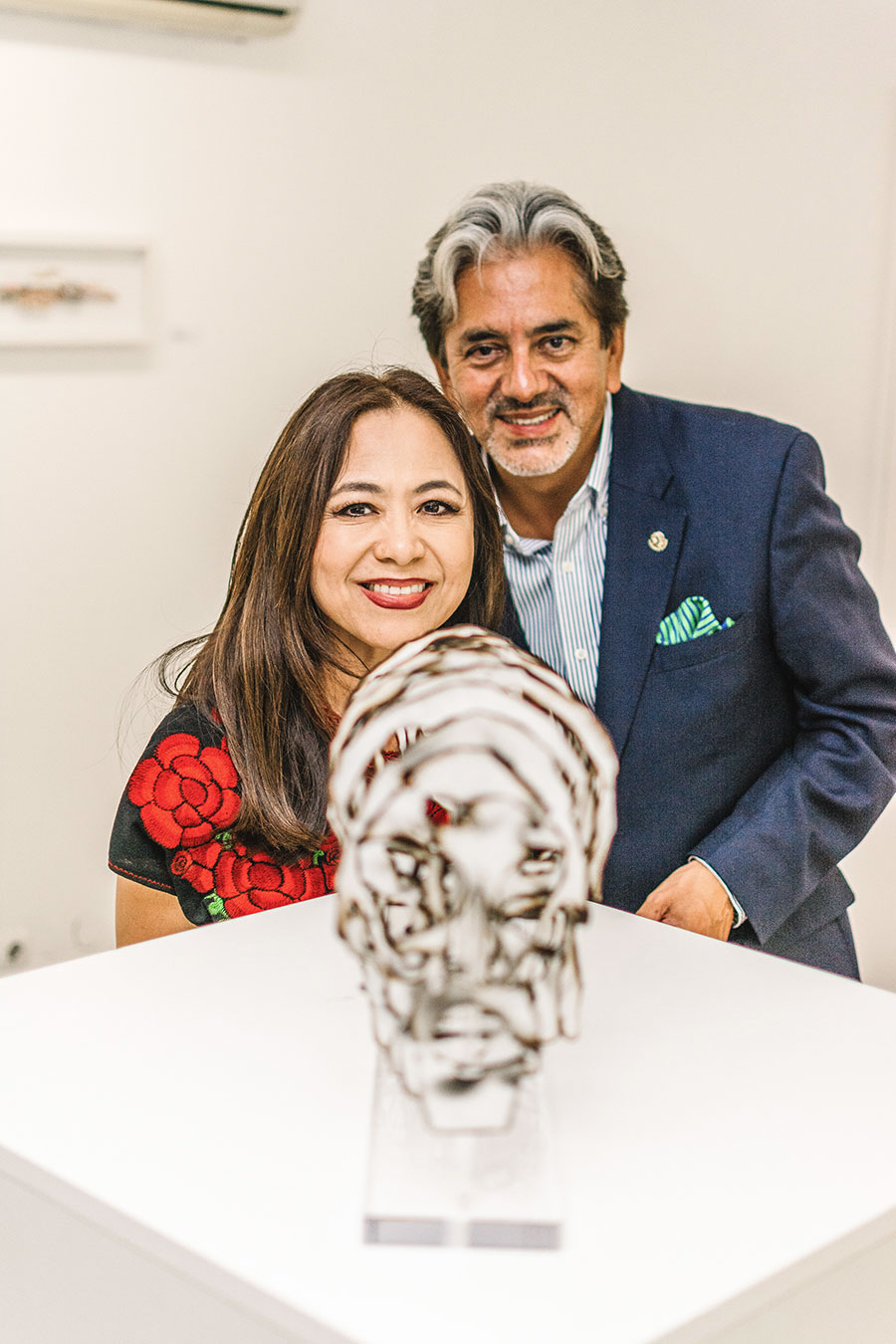 The diplomatic couple at the opening of the Unfold Exhibition at the K.A.S. Gallery (13-06-2017) (Photo by Mexican Embassy)
The diplomatic couple at the opening of the Unfold Exhibition at the K.A.S. Gallery (13-06-2017) (Photo by Mexican Embassy)
Getting to Know Each Other Better
[To Mr. Ambassador] It has been almost three years since you assumed your responsible position, followed by a multitude of experiences of various Mexican colors and flavors. Will you please highlight those activities that contributed to further the good Mexican-Hungarian partnership.
As you might know, during these two years, the Mexican Embassy has been quite active. The most public part of our presence is certainly our cultural agenda. The great Frida Kahlo exhibition was visited by over 200,000 people in 2018. Also, we are trying hard to promote the Spanish language among young Hungarians with thousands of them already studying it. We let them know that we are very happy that they have decided to study Spanish and that has been a very good decision. In the most part of the cases, they chose Spanish because it is attractive for them because of the melody of the words, because of the culture but at the same time, it is also a very smart professional decision, since Spanish is going to be in a very short period of time one of the biggest languages used in international business. Through the Spanish language, we promote tourism, history, cuisine, etcetera as we think that it is a great way to approach different countries, and we are convinced that peace, cooperation, trade happen much better if we know each other better.
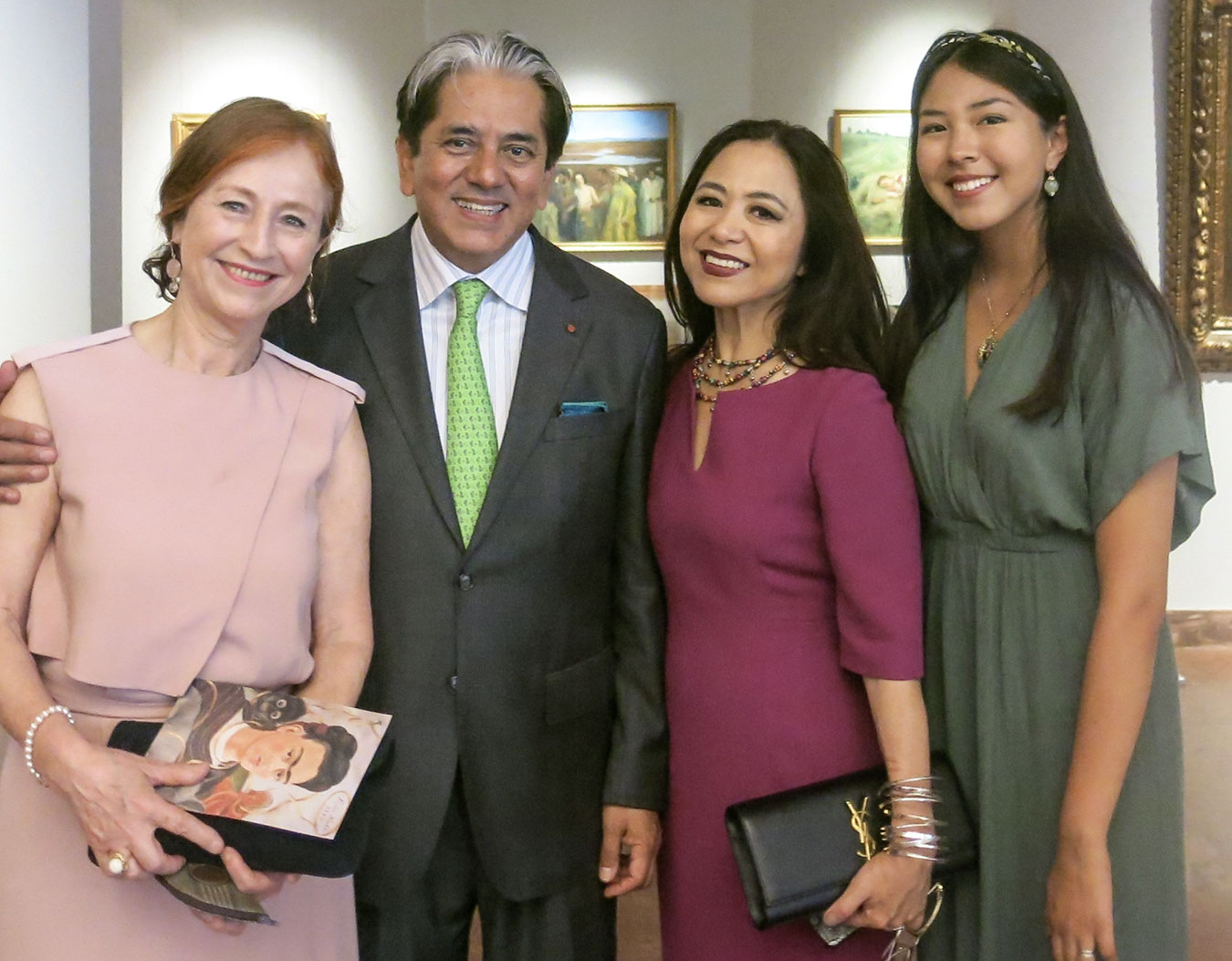 Mr. and Madame Ambassador in the company of their daughter and Mexican historian Elizabeth Baquedano at the opening of the Frida Kahlo Exhibition at the Hungarian National Gallery (07-07-2018) (Photo by Mexican Embassy)
Mr. and Madame Ambassador in the company of their daughter and Mexican historian Elizabeth Baquedano at the opening of the Frida Kahlo Exhibition at the Hungarian National Gallery (07-07-2018) (Photo by Mexican Embassy)
Cooperation
[To Mr. Ambassador] Our world is changing faster than ever before. Best practices, old recipes, and remedies seem to be inefficient. From the perspective of international security and stability, what do you think should be done and in which ways can our two countries contribute to the greater good?
Many of the problems that we are experiencing are not just national ones. The international structure of national states faces challenges related to pollution, scarcity of resources, migration, religion among others, and these issues are that not necessarily stopped or defined by a political boundary like it was before. Cooperation between states is basic in order to build a new infrastructure of international security and stability. How much is that, what is the price we pay for that? Well, it is not easy to answer. This is something that we can observe every day in the debates for example in the European Union that by the way, in my opinion, has a success story up to now. So, if people do not believe what I am saying just think 70 years ago: the conditions of this city, this country, this region, this continent. Without the international organizations that create conditions for peace, maybe there would still be for centuries war after war, invasions, resistance, famines and so on, like it was before. To me, it clearly shows that cooperation creates international security and stability. So what our two countries could do on this: well, first of all, to be fully responsible for our duties towards not just our own regional alliances but basically our commitments towards the United Nations which is facing challenges all over the world and not only in our regions.
♦ ♦ ♦ ♦ ♦
✅ Do you like the article? Like and share it!
⛔ Any constructive opinion? Let it flow out! Write a comment!
❓ Are you curious what other exciting and interesting articles are coming up next? Definitely click on the KÖVETÉS (i.e. Follow) button in the upper right corner!
➕ Are you wondering who pulls the strings in the background? Are you keen on getting more details? Join me on Facebook and Instagram!
Like me on clicking at www.facebook.com/diplomaciamindenkinek!
♦ ♦ ♦ ♦ ♦
Negotiation and Communication
[To both] Taking your bond as a good example, if we consider marriage a union of two souls striving to become more than the sum of their individual parts and implement the same idea for diplomacy, what should be applied more often when disputes arise between states in order to find a comprehensive and sustainable solution?
Well, honestly, we do not know what is more complicated: marriage or an alliance between states. Many times, the alliance between the states is much more defined by individuals than really by the states as an institution or by nations as a complex of the population or the leaders. And if we think of terrible stories for example during the second world war and the kind of leaders those years, we can clearly see how the individuals’ decisions conduct the world to war. We can observe the same scenario in the summer of 1914 before the first world war: how the individuals and their personalities created conditions that led to something seemingly stoppable, and then it turned out to be actually unstoppable. Nowadays, if we think of a process as complicated as Brexit, it is based more on individuals than really the social will. So, this is a challenge that democracies are facing and demonstrates how the common ground of political institutions that democratic systems provide has become an instrument for leaders to make decisions that move a whole nation in a very different direction far from its original orientation. So, there is not a simple response because this is one of the most challenging issues we are facing right now. Of course, the obvious response would be to negotiate but before that what you have is again the individual attitude towards negotiation: do you really want to negotiate? Do you really want to talk with the counterpart, do you really want to resolve the problem or you have already decided that you will go until the end in a dispute? In diplomacy as in a personal relation, to negotiate and talk always will be better than a confrontation.
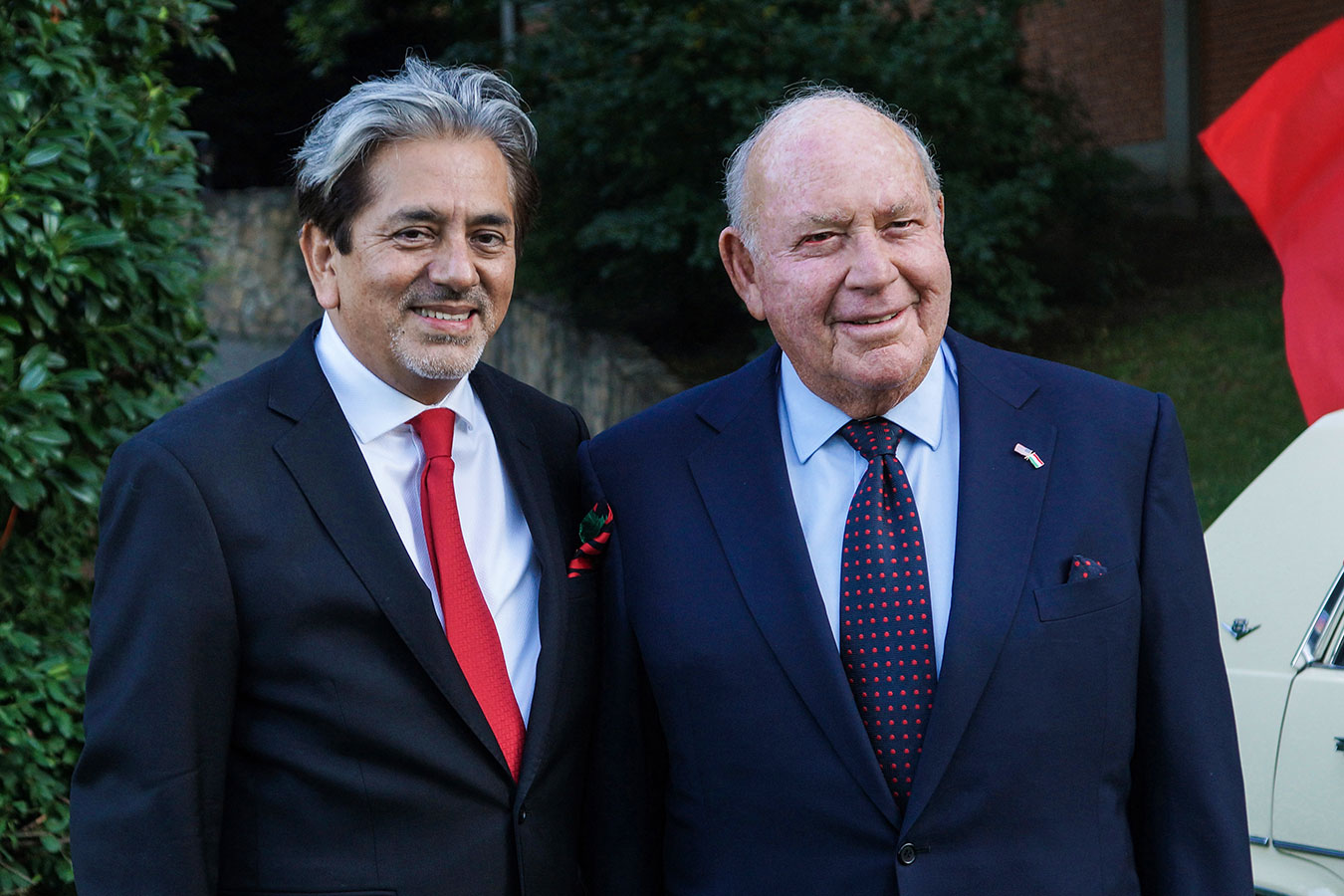 Mr. Ambassador with his American counterpart, H.E. David B. Cornstein (12-09-2019) (Photo by Ivan Aigner)
Mr. Ambassador with his American counterpart, H.E. David B. Cornstein (12-09-2019) (Photo by Ivan Aigner)
Prudence and Dedication
[To Madam Ambassador] Which issues matter to you the most? Do you find the time to be engaged in those activities?
As an ambassador, I have a daily list of issues to deal with in my job. In recent years I have been in charge of the relation and presence of Mexico towards a set of international organizations based in London. The most demanding one is the International Maritime Organization (IMO), whereas you can imagine, there are not too many women. Of course, I am trying to promote a stronger presence of women in the maritime world which is one of my objectives, although it is certainly neither the main nor the only one because as a Mexican representative, I have to focus on the challenges posed to Mexico and the Organization as a whole. I have the chance, many times in cooperation with my husband, to support educational projects or assisting people in need in the countries where we have been posted or directly in Mexico, we try to do it often and it is something important for us, a work where growingly is our daughter the one who pushes us to act. In the beginning, I was surprised to discover how influential you can be for the position you have. I think this is a very relevant soft power that we have and I try to use it responsibly and get engaged with serious issues. In summary, it is our duty to use it carefully but fully dedicated also.
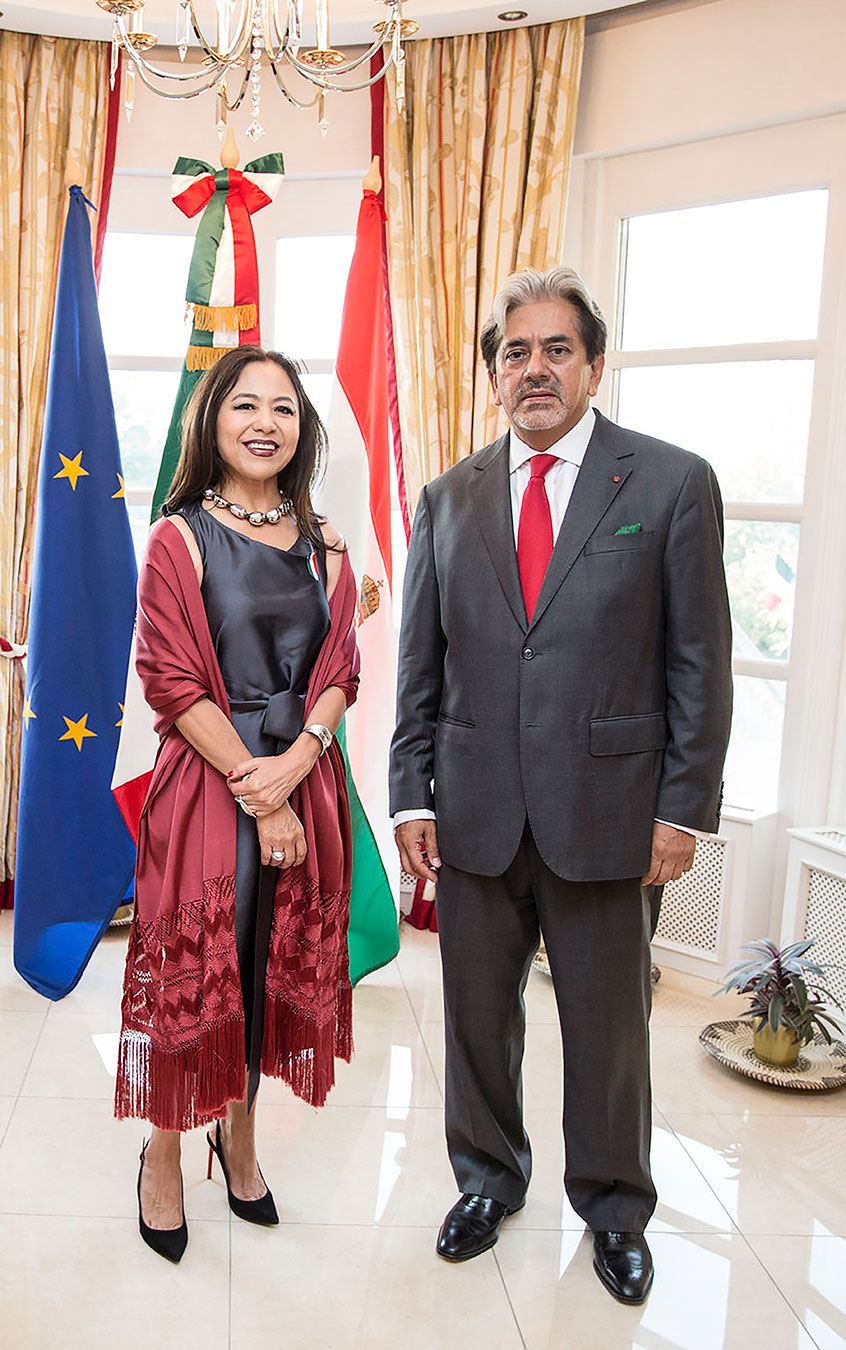 Mr. and Madam Ambassador at the Mexican National Day reception (13-09-2018) (Photo by Mexican Embassy)
Mr. and Madam Ambassador at the Mexican National Day reception (13-09-2018) (Photo by Mexican Embassy)
The Next Generation
[To both] What kind of world would you like to leave behind for your daughter’s generation? What challenges do we have to deal with, in your opinion, to turn your wish into reality?
It is a question that surely our parents used to think about when they were younger as it is a human question that every generation considers. Our parents worked very hard to make a better living in Mexico and that is the kind of Mexico we received from them. And as mentioned before: we, Mexicans, such as sometimes the Hungarians, are not so optimistic and then we can be critical to our conditions. But on second thought, I certainly have been living in a much better world than my parents’ generation. For my daughter’s generation, as I see even at a younger age, I find them much more responsible than we were because the main concerns are already a reality. I have referred more than once to climate change as one of the most urging issues around us. But they perceive also some of the more immediate problems as they have to deal with them day after day, such as corruption, instability or personal security not to mention that in spite of the improvement, it is a fact is that we are a quite unequal society. I am not talking about my own country; I am talking about the whole world. The challenges are not local, regional, or national anymore, they are global in a way that was not seen before. And they are facing global challenges no matter where they are, and they get affected by those global issues even if they do not want to. I am sure that this younger generation has better tools: intellectual, technical tools than the ones we had, and they have better knowledge, wider perspective and I am sure they are going to succeed.
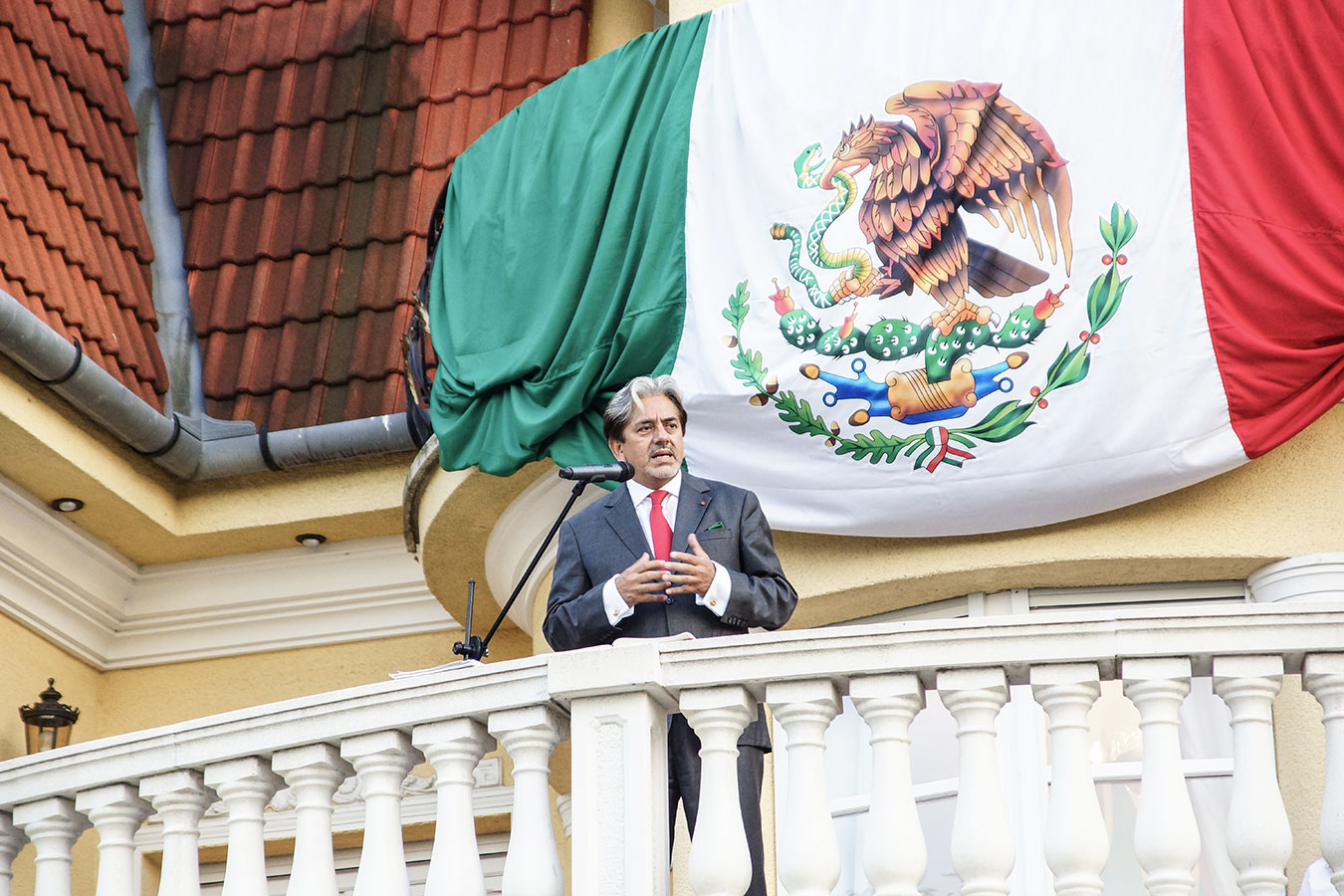 Ambassador Nájera Rivas delivering his speech at the Mexican National Day reception (13-09-2018) (Photo by Ivan Aigner)
Ambassador Nájera Rivas delivering his speech at the Mexican National Day reception (13-09-2018) (Photo by Ivan Aigner)
Useful Links
Do you want to know more about Mexico, the operation and mission of the Mexican Embassy? Are you interested in Mexican-related programs and events? Visit the Official website of the Mexican Embassy...




